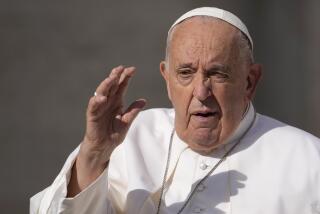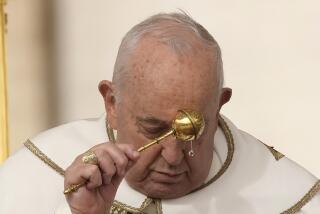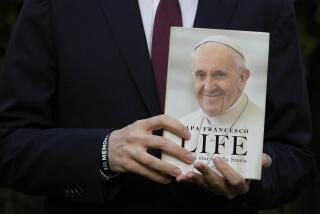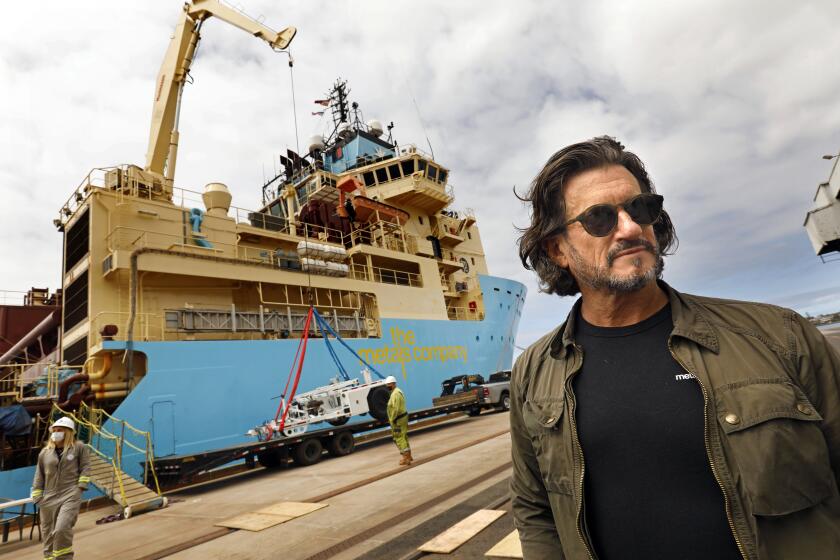Pope Francis calls for decentralized Catholic Church in manifesto
ROME — Eight months into his headline-grabbing papacy, Pope Francis issued a wide-ranging manifesto Tuesday in which he sharply criticizes the excesses of capitalism and says he wants a decentralized Roman Catholic Church that is “bruised, hurting and dirty because it has been out on the streets.”
Francis’ 84-page Apostolic Exhortation, titled “The Joy of the Gospel,” gathers together a number of the causes he has championed in speeches and homilies since being elected in March, including the need for “a conversion of the papacy,” to reverse the “excessive centralization.”
While not offering new doctrine, the exhortation offers the best summation yet of the pope’s priorities and passions. He writes that there are “two great issues which strike me as fundamental at this time in history.... These issues are first, the inclusion of the poor in society, and second, peace and social dialogue.”
Characterized by Francis’ trademark conversational tone, the document is his first real written work as pope. He released an encyclical letter in June, but it was based on a draft prepared by his predecessor, Pope Benedict XVI.
Vatican expert John Allen, writing in the National Catholic Reporter, compared “The Joy of the Gospel” to Martin Luther King Jr.’s “I Have a Dream” speech, noting that Francis begins by describing a dream of a church that is driven by a missionary impulse, not “self-preservation.” The manifesto is characterized by this missionary zeal and warns against a church “which is unhealthy from being confined and from clinging to its own security.”
Priests should head out to care for and defend the victims of unmerciful financial markets, said the 76-year-old Argentine pontiff, picking up on his predecessor’s sharp attack on modern capitalism.
“How can it be that it is not a news item when an elderly homeless person dies of exposure, but it is news when the stock market loses two points?” writes Francis, who recently called for unused monasteries in Italy to be turned over to homeless African migrants.
“Today everything comes under the laws of competition and the survival of the fittest, where the powerful feed upon the powerless. As a consequence, masses of people find themselves excluded and marginalized: without work, without possibilities, without any means of escape.”
Trickle-down theories of economics were not proved, involved a “crude and naive trust in the goodness of those wielding economic power” and were likely to lead to violence rather than wealth, he argues, urging politicians to carry out ethics-based financial reform. “Money must serve, not rule!”
In a lighter vein, Francis also instructed priests on how to write homilies that don’t bore congregations, told them that confessions should not be “torture” and advised them not to be defeatist “sourpusses.”
He also warned that he would not be changing the church’s viewpoint on abortion, gay marriage and female priests, although he did call for women to be given more decision-making clout within the church.
On the Vatican’s opposition to abortion, Francis says the church “cannot be expected to change her position on this question.”
The pope captured attention in September when he complained that the Catholic Church had been “obsessed” with issues such as abortion, gay marriage and contraception, to the exclusion of other important matters.
Francis devoted much of the space in “The Joy of the Gospel” to the work of the priesthood and the proclamation of the church’s Gospel, including sections with elaborate discussions about how to preach. He acknowledges at one point that he has delved into such topics “with a detail that some may find excessive.”
In one passage that could have implications for clerics who refuse to offer Communion to divorced people or to politicians who support abortion rights, he writes that the Eucharist, the central rite of Catholicism, “is not a prize for the perfect but a powerful medicine and nourishment for the weak.”
“Frequently, we act as arbiters of grace rather than its facilitators. But the church is not a tollhouse; it is the house of the Father, where there is a place for everyone, with all their problems.”
Kington is a special correspondent.
More to Read
Sign up for Essential California
The most important California stories and recommendations in your inbox every morning.
You may occasionally receive promotional content from the Los Angeles Times.





